
Coming to Beijing without a support system can be tough, but sometimes it’s even worse to have such a network come through your partner. Such is the case for many couples who move to Beijing for a job offer, leaving one half to become the “trailing spouse.” Such a change can be uncomfortable even in a familiar setting, but these feelings are often compounded for newcomers who can’t speak the language, don’t know the city, and are having trouble adjusting to cultural differences. These factors can leave them feeling isolated, lost, and without purpose.
Fortunately, there are many ways to keep busy and stay connected. Jaclyn Dam Laute initially relied on her husband’s company for support, but she adjusted, achieved independence, and even established a dental clinic.
A certified dentist and the owner of IDC Dental, Laute recommends that trailing spouses use their partner’s resources as a springboard rather than a crutch. “You need to know what company support is available and take full advantage of it. But then you need to establish you own network, and seek activities outside of the home,” she says.
Finding a community of your own can challenging, especially for newcomers who have a little one in tow and don’t speak Chinese. However, parents can rely on their child’s school as a resource and support network.
“Upon arriving I immediately immersed myself into the parent-teacher organization at my son’s international school,” says Patrice Christie, a trainer and dental educator at IDC Dental. “That allowed me to meet other expat women and their families. We shopped together, dined together, and volunteered together at an orphanage and women’s group home.”
Nemanja Arandelovic, a guidance counselor at the Canadian International School of Beijing, says that getting involved in your children’s school life can drastically brighten your routine.
“It’s a great way to help your kids, get to know the school, and get tips from other parents about how to adjust,” he says. “People are social animals and we need that support.”
Arandelovic adds that ties between parents can often become crucial once they spend some time in a new locale and the novelty begins to wear off. “Most expats typically go through stages of adjustment. At first there’s euphoria, but after awhile they’ll get frustrated with the challenges and unfamiliar things they encounter,” he says. “New contacts help you continue to adjust rather that withdraw and only maintain contact with people back home.”
Christie attributes her success in pushing past such growing pains to the parent-teacher organization at her son’s school. From there, she scoured expat magazines, social networks, and other sources to make more friends and acquaintances.
“There are a multitude of groups here ranging from hikers to bikers,” she says. “Get a hold of any expat magazines and educate yourself on what’s happening in the foreign community in Beijing, then make sure you attend some events.”
Such happenings are designed to help laowai connect, both with each other and their new locale. “New people are drawn to each other and, because you are sharing similar experiences at the time, you tend to make fast friendships,” adds Christie. “Volunteering is another great way to make a positive contribution to the community. It offers a wealth of opportunities to learn more about this city and its culture, and it exercises our compassion for others.”
Aside from a healthy social circle, both Laute and Christie say that developing a professional identity can also make life in Beijing vastly more enjoyable. “You should have a plan on how long you would remain a non-working spouse, and have a way to keep your skill set and home country network current,” advises Laute.

She took a proactive approach. Before arriving in Beijing, the telecommunications company that employed her husband also helped her look for work of her own.
“I soon had a job at an international hospital,” Laute says of her eight-year stint at Beijing United Family Hospital (BJU), where she helped set up a clinic, got it licensed, and eventually became chair of the dental department. “During this time, I also had two children, and experienced Beijing as a new mom and as a working mom.”
“But we eventually localized. I transitioned away from my initial employer and found myself in a completely unique situation, as a foreigner providing consultation in setting up and running a dental business from scratch.”
That was the key for Laute – not only establishing a routine, but also building upon it and finding new ways to thrive to avoid being stuck in a rut or trapped in an expat bubble.
Most expats, of course, will need more time to map out such a personal and professional plan. Christie didn’t begin such a process until after her arrival, but she was still able to strike out on her own once she gained her footing in Beijing.
“Within 18 months, I applied at BJU’s dental clinic for a position as a dental hygienist,” she says. “I am a licensed dental professional in America and I wanted to utilize my skills in China. That led me to a position at IDC Dental as a dental educator.”
Like Laute, that professional itch eventually prompted Christie to become an entrepreneur. “I started a small enterprise selling silk items produced in Shanghai,” she says. “I sold at local bazaars and at expat events.”
Other expats decide to take advantage of their downtime by going back to school. Crystal Wolfgram and her husband Julian Tolhurst arrived in Beijing in 2012 from Ottawa to work as high school teachers. But this year, Wolfgram decided to stop giving homework assignment and hit the books herself, beginning online courses in Human Resources. She says such a career switch would have been more difficult back home.
“If you were going to pick anywhere to do it, Asia would be the place because it’s so much easier for couples to live off one income,” says Wolfgram. “A lot of companies in this city cover flight tickets, housing, and utilities, so that makes it all so much easier.”
Of course, many expats may not want to pursue a career change or a new job during their stay in Beijing, but Wolfgram says that those individuals would have little reason to feel bored.
“There are so many festivals and chances to volunteer,” she says, citing the annual Bookworm International Literary Festival as one of her favorite events. Such a multitude of options is crucial, because keeping busy helps stave off homesickness and culture shock.
Most of all, Christie says newcomers need to show enough confidence to immerse themselves in their new surroundings – at least a little. She sees no benefit in exclusively frequenting western restaurants, foreign coffee chains, and strictly English-speaking neighborhoods. Instead, expats should make an effort to visit Chinese teahouses and restaurants, explore hutongs, and study at least a little hanyu.
“If you stay in the westernized areas, you’ll find it horribly frustrating. You limit yourself in where you can go and what you can do,” she says. “You tend to repeat the same things, which is boring, uninspired, and sets up resentment about being here.”
“It makes a huge difference to learn Mandarin – at least conversational – so that you can order food or tell the taxi where to go, or greet and chat with someone. The Chinese appreciate it when you make an effort. Then you start to feel like you’re integrating, and it gives you a sense of accomplishment.”
This article originally appeared in the beijingkids Home & Relocation Guide 2014. To get your free copy, email distribution@truerun.com or view it online at Issuu.
Photos courtesy of IDC Dental



